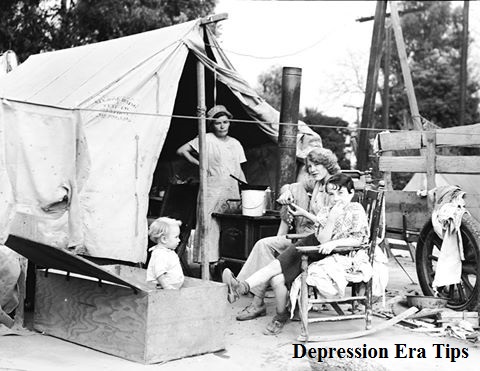Depression Era Tips
I think my grandparents got lucky during the depression, they heard a rumor a few days before the sheriff Dept. came to there apartment building and kicked everyone out. The building was bulldozed down. They packed up everything and went to my Great grandparents farm storing thing’s in the barn. they lived there and worked the land gardening, forging and finding odd job’s till it was over
Depression Era tips
1. BUY LESS – Spending begets spending. Sometimes it feels like the more you buy, the more you need. Spending less stops this cycle.
2. MAKE DO – flip side of buying less is to make do with what you have. That means getting creative with what you have already.
3. DIY – We’ve lost a lot of the skills we used to have. DIY-ing is a great way to gain back those skills. Learn to lay tiles or pavers, paint, hang pictures or doors.
4. MAKE YOUR OWN – Need a new dining table? Or a new bed frame? Why not try your hand at making your own. Have you seen the Ana White website? Lots of amazing free projects that show a woman is a just as capable with a hammer and saw!
5. REPAIR – It’s too easy (and often cheaper, unfortunately) to toss what’s broken and buy a new one. But if you can, repair instead of replace. It reduces landfill, which is also an important consideration.
6. MAINTAIN WHAT YOU HAVE – One of the most important ways to save money is to maintain what you own so that it lasts as long as possible. A maintenance schedule helps you keep track of maintenance tasks. A stitch in time…
7. REPURPOSE REUSE – In the past, nothing was thrown away, everything had a second or even third life. Bread bags can be used as freezer bags or garbage bags. Old clothes can use cut down into new clothes or used in quilting or in cut into rags (saving the buttons and zips of course). Containers, jars and boxes can be repurposed for storage.
8. DITCH DISPOSABLES – On the other hand, the first ‘R’ in the maxim is reduce, so it’s better to avoid than reuse or repurpose. Disposables force you to spend money on the same thing week in, week out. Reusable alternatives means you have a once of payment, saving you money over the years.
9. MEND CLOTHING – and make it last as long as possible.
10. SEW YOUR OWN – and if you make your own clothing, linen, bedspreads etc., you’ll be more likely to want to make it last as long as possible after putting in all that work.
11. BUY SECOND HAND – and save you money, reduce consumption and keep things out of landfill.
12. WEAR AN APRON – an apron will protect your clothes from stains, helping them to last longer.
13. LEARN A HANDICRAFT OR TWO – handicrafts make useful hobbies. Avoid boredom and end up with something useful as an end product. Craftsy’s FREE mini courses are a great place to start. They cover everything from sewing, cake decorating, woodwork, gardening plus a whole heap more.
14. INCLUDE HOME REMEDIES – I’m not against modern medicine, it’s a wonderful thing and we use it a lot. But there’s a place for home remedies too, and they can be just as affective as modern medicine or compliment modern medicine when it comes to symptoms management.
15. CLEAN NATURALLY – Natural, homemade cleaners are usually just as affective as chemical cleaners, but they are cheaper and reduce the toxic load in the home.
16. USE A HOT WATER BOTTLE – a cheaper way to warm the bed and stay warm in winter.
17. PUT ON A JUMPER – layer layer layer before turning on the heating.
18. SPEND MORE TIME OUTSIDE – too hot inside? Take your inside work outside and enjoy a cool breeze in the shade.
19. HAND WASH – rather than relying on the washing machine all the time.
20. WEAR CLOTHES MORE THAN ONCE – if the clothes aren’t dirty, wear them again before washing and reduce the number of washes you do.
21. WEEKLY WASH DAY – having a weekly wash day may seem a bit outdated, but in a time when people wash towels and clothes every single day washing things like towels and linen weekly instead of daily will reduce your number of washes.
22. HANG CLOTHES TO DRY – instead of using the dryer. Raining?.
23. BAKE WHEN THE OVEN IS ON – make the most of the oven and throw in a slice or some bickies while your baking something else.
24. HAVE A BAKING DAY – Ever read old books and they’ve always got a chocolate cake or some bickies in a tin in the pantry. That’s thanks to the weekly bake day. We have the benefit of being able to freeze our baking for later.
25. PRESEVE – Freeze fruit and vegetables or make jams and other preserves so that today’s harvest doesn’t go to waste and you can make the most of it out of season.
26. SAVE GREASE – and cook your food in the saved fat. Potatoes fried in bacon fat – cheap and delicious.
27. HAND WASH DISHES – washing in a dishwasher saves you water, but it can cost you a fortune in electricity. Instead, hand wash dishes in minimal water to save.
28. FORAGE – an almost forgotten skill, feed yourself for free with plants that grow around your neighborhood (not the neighbors veggie patch though). Just make sure you know how to identify plants before eating them.
29. SCRAPE THE LAST FROM THE JAR – a small rubber spatula is the perfect tool for this. Making jam milk shakes with the last bit in the jar is another alternative.
30. HAND MIX – or grate or chop. Use man power and save.
31. COOK FROM SCRATCH – and eat healthy food that’s cheaper than processed and packaged food.
32. HEAD TO TAIL EATING – The most nutritious part of an animal is the organ meat and it’s cheap, but it’s rarely eaten. In the past, no part of the animal go wasted – from sheep’s head stew to making stock from the bones and sausages from the intestines.
33. DON’T BUY WHAT YOU CAN MAKE – yoghurt is a good example of this. It’s easy to make at home and costs a fraction of the price of store bought.
34.MAKE SOAP – most soap from the supermarket is stripped of glycerine (the good stuff for your skin) and includes chemicals. Make your own better quality soap. If you use scraps, it will cost you next to nothing.
35. DRY YOUR SOAPS – Soap, whether hand made or purchased, will last longer if it has been dried. Place your soap in your clothes cupboard to dry out, give your clothes a nice smell and to ward of silverfish.
36. REUSE WRAPPING PAPER AND CARDS AND SCRAP PAPER – back to waste nothing. Save on wrapping presents by keeping and reusing wrapping paper and cards. Use junk mail as scrap paper and envelopes for the shopping list.
37. CURL YOUR HAIR WITH RAGS – instead of using a curling iron and save electricity.
38. SQUEEZE OUT THE LAST OF THE TOOTHPASTE – by rolling the tube to use up every last drop. Use a q-tip to get out the last of the lipstick. Cut open the shampoo bottle or add water to use the last drop of shampoo.
39. FLUSH LESS – If it’s yellow, let it mellow, if it’s brown flush it down. Do I need to say more? A brick or a bottle of water in a old fashioned toilet will reduce the amount of water per flush, but if you have a modern toilet, this probably isn’t necessary.
40 SHOWER LESS – eww right? But why shower on days that you’ve spent all day lounging around at home? People haven’t always had (or needed) the luxury of showering everyday. A sponge bath will save water and is sufficient to get clean on many days.
41. REUSABLE FEMALE HYGEINE PRODUCTS – thanks to modern updates, this doesn’t mean using rags every month. The mooncup, for instance, is a better, healthier, more convenient alternative to disposable products and it saves you money.
42. USE THE LOCAL LIBRARY – the local library has so much more than just books. Watch DVDs, use the computers, borrow puzzles and board games, listen to music. And most importantly, use the books to learn new skills.
43. ENTERTAIN YOURSELF IN USEFUL WAYS – Useful hobbies like gardening, sewing, handicraft, woodwork, tinkering, DIY etc. will not only keep you entertained, they will make you happier and save you money.
44. FREE ENTERTAINMENT – Instead of spending time at the shops, cafes, theme parks or even in front of the TV or xBox, frugal entertainment includes hanging with friends, picnics at the park, a day at the beach, playing board games, reading, telling stories.
45. COMMUNITY INVOLVEMENT – Getting involved in your local community is a great way to meet new people, be more happy, give back to the community and enjoy yourself at the same time, without spending money.
46. GROW YOUR OWN FOOD – Even just a few herbs on a windowsill is a good start towards supplementing your budget with your own fresh produce. Organic food comes at a premium, but home grown organic food will save you money.
47. COMPOST – In the spirit of waste not, composting scraps to add to your veggie garden is the ultimate in recycling and saving money.
Reducing waste and being savvy with your money never gets old. These frugal tips from our grandparent’s era will never go out of date.
AND WE THINK WE’VE GOT IT BAD
Makes complaining about no cell service, high gasoline prices, not enough cable channels, it all, seem a bit ludicrous!
 This is an aggregated site. Please be aware some of the sites we link to could have pop ups. We have no control over them. However, we will never link you to a site that requires you to make any purchase to view the blog.
This is an aggregated site. Please be aware some of the sites we link to could have pop ups. We have no control over them. However, we will never link you to a site that requires you to make any purchase to view the blog.
Please read our disclaimer. We provide you with information from various sites all over the world. The author’s expressed opinion isn’t necessarily that of The Prepared Page or its staff. Our intent is to bring you the information. Use your and your own best judgment when using any information contained within the blogs.
While you’re here check out some of the other posts you may find them interesting!!!
Some posts may contain affiliate links.








